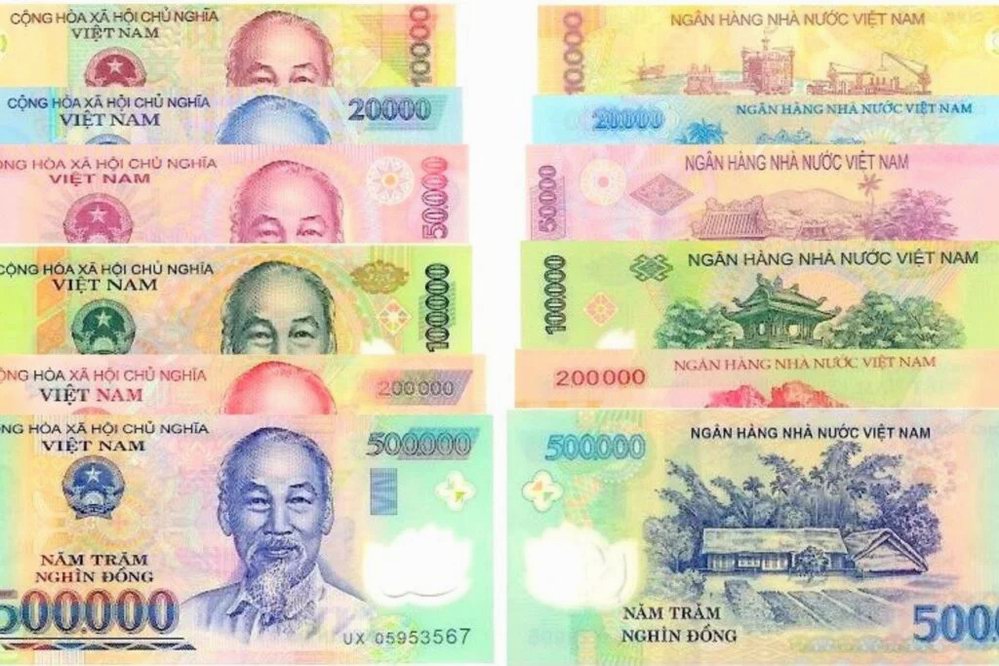Vietnam Currency and Money
Vietnam currency and money

When planning our trip, one of the things we'll need to know is the name of
Vietnam's currency, where we can exchange it, and the exchange rate.
Therefore, below we'll provide the information you need for your trip about
Vietnam's currency and its specific features.
What is the name of Vietnam's currency and what is its exchange rate?
The legal tender in Vietnam is called the Dong (VND). Its exchange rate with
the euro is 1 euro = 26,000 dong or 1 US dollar = 23,000 dong. Both
currencies are widely accepted.
In any case, if you want to know the quote in real time, you can use the
following online converter.
Since dongs are always moved in very high quantities, you'll have the
opportunity to become millionaires during your trip to Vietnam. The origin
of this lies in the fluctuations in the currency's value over time, the
impact of the global economy on the Vietnamese economy, and the economic
policies adopted by the nation's government.
Vietnamese Dong banknotes and things to keep in mind when using them
In Vietnam, banknotes range from a minimum of 100 dong to a maximum of
500,000 dong (just under 20 euros). All of them feature Ho Chi Minh's effigy
on the front and monuments or representative sites of the country on the
back.
Other banknotes you'll commonly handle are those corresponding to the
amounts of 2,000, 5,000, 10,000, 20,000, 50,000, and 100,000 dong. They are
easily identified by their different colors. If you handle Vietnamese
currency for a moment, you'll quickly realize that the smaller banknotes,
specifically the 100 and 200 dong, are no longer in use. Larger banknotes
are used almost exclusively. This is a consequence of depreciation, which
has favored the use of banknotes, and the obsolescence of coins, which have
been reduced, for most purposes, to mere commemorative paper.
One thing you should keep in mind is that your banknotes are not damaged,
scratched, or otherwise flawed, as they will not be accepted. Interestingly,
perhaps in an attempt to avoid these types of problems, the nation's
government has opted to eliminate cotton paper banknotes, common in most
countries, replacing them with polymer banknotes.
Where to exchange Vietnamese Dongs
First, let me tell you that the most widely accepted foreign currencies are
the US dollar and the euro.
If you want to buy Vietnamese currency, you will have to go to banks, ATMs,
exchange offices, jewelry stores, or gold shops.
Jewelry and gold shops for Vietnamese currency
Without a doubt, the best places to exchange Vietnamese Dong are jewelry
stores and gold shops. They usually have a dedicated counter for this
purpose or will offer it to you directly. The exchange rate varies from one
to another, so it's always a good idea to compare a couple of places and use
those that are far from tourist spots.
Currency exchange offices in Vietnam
Currency exchange offices are also a good option. However, rates vary from
one to another, and those located in tourist areas tend to have higher
rates.
Exchange Vietnamese Dongs at banks
Major international banks have branches in Ho Chi Minh City and Hanoi ,
allowing you to exchange Vietnamese currency or withdraw cash with any Visa
(the most widely accepted by far), Mastercard, or Cirrus card, although they
charge a fairly high fee. Most banks usually have ATMs open 24 hours a day
and accept Visa cards. Fees vary from bank to bank; banks like ING and EVO
charge no fee, but in some cases, the opposite is true, and you could get a
real shock. Vietcombank is considered a very good option for exchanging
euros or dollars into VND. Its regular hours are from 7 a.m. to 11 a.m. and
from 1 p.m. to 5 p.m.
Withdrawing money from ATMs in Vietnam
Throughout your stay in Vietnam, you'll notice that there are quite a few
ATMs, especially in the larger cities. To easily recognize them, remember
that ATMs are usually marked with a small sign that says ATM (automatic
transfer machine). In any case, ATMs have two drawbacks:
- They usually give out large bills, which can make shopping more difficult
later on, as they are not accepted everywhere.
- They apply a commission rate that can be around 3%, to which you will have
to add the commission of your bank at origin
Therefore, you should avoid obtaining Vietnamese dong at ATMs as much as
possible.
Exchange Vietnamese Dongs at hotels
A last resort for exchanging Vietnamese dong is to go to hotels. But unless
you absolutely have to, try to avoid them, because just like ATMs, you'll
lose quite a bit on the exchange rate.
One last recommendation about currency in Vietnam
It's best to always carry cash with you , especially if you're traveling to
smaller towns. Credit cards, despite their increasing popularity, are
usually only accepted in large shopping centers, tourist-heavy areas, and
hotels. However, we advise against exchanging too much money at once. You
can exchange it as needed. Keep in mind that any leftover Vietnamese
currency at the end of your trip will have to be exchanged at the airport
for euros or dollars at an extremely unfavorable exchange rate, or you can
bring it back as a souvenir.





